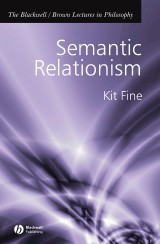Details

Semantic Relationism
The Blackwell / Brown Lectures in Philosophy 1. Aufl.
|
72,99 € |
|
| Verlag: | Wiley-Blackwell |
| Format: | |
| Veröffentl.: | 15.04.2008 |
| ISBN/EAN: | 9780470766002 |
| Sprache: | englisch |
| Anzahl Seiten: | 160 |
DRM-geschütztes eBook, Sie benötigen z.B. Adobe Digital Editions und eine Adobe ID zum Lesen.
Beschreibungen
Introducing a new and ambitious position in the field, Kit Fine’s <i>Semantic Relationism</i> is a major contribution to the philosophy of language.<br /> <ul> <li>Written by one of today’s most respected philosophers<br /> </li> <li>Argues for a fundamentally new approach to the study of representation in language and thought<br /> </li> <li>Proposes that there may be representational relationships between expressions or elements of thought that are not grounded in the intrinsic representational features of the expressions or elements themselves<br /> </li> <li>Forms part of the prestigious new <i>Blackwell/Brown Lectures in Philosophy</i> series, based on an ongoing series of lectures by today’s leading philosophers</li> </ul>
Preface. <p>Introduction.</p> <p><b>1. Coordination among Variables</b>.</p> <p>A. The Desiderata.</p> <p>B. The Problem.</p> <p>C. The Contextualist Response.</p> <p>D. The Dismissive Response.</p> <p>E. The Instantial Approach.</p> <p>F. The Algebraic Approach.</p> <p>G. Relational Semantics for First-order Logic.</p> <p><b>2. Coordination within Language.</b></p> <p>A. Frege’s Puzzle.</p> <p>B. Rejecting Compositionality.</p> <p>C. Semantic Fact.</p> <p>D. Closure.</p> <p>E. Referentialism Reconsidered.</p> <p>F. A Relational Semantics for Names.</p> <p>G. Transparency.</p> <p><b>3. Coordination within Thought.</b></p> <p>A. Intentional Coordination.</p> <p>B. Strict Co-representation.</p> <p>C. The Content of Thought.</p> <p>D. The Cognitive Puzzle.</p> <p><b>4. Coordination between Speakers.</b></p> <p>A. Kripke’s Puzzle.</p> <p>B. Some Related Puzzles.</p> <p>C. A Response.</p> <p>D. A Solution.</p> <p>E. A Deeper Puzzle.</p> <p>F. A Deeper Solution.</p> <p>G. The Role of Variables in Belief Reports.</p> <p>H. Some Semantical Morals.</p> <p>Postscript: Further Work.</p> <p>Index</p>
"Combines careful, detailed argumentation with inspiration and synoptic vision for the bigger picture. ... One can reasonably expect Fine's book to be a spur for thinking about these issues for many years to come." (<i>Mind</i>, October 2009)
<b>Kit Fine</b> is Silver Professor of Philosophy and Mathematics at New York University, and specializes in Metaphysics, Logic, and Philosophy of Language. He has held fellowships from the Guggenheim Foundation and the American Council of Learned Societies and is a former editor of the <i>Journal of Symbolic Logic</i>. He is the author of <i>Modality and Tense: Philosophical Papers</i> (2005), and the co-author of <i>Worlds, Times and Selves </i>and<i> Reasoning with Arbitrary Objects</i> (Blackwell, 1985). He has also written papers in ancient philosophy, linguistics, computer science, and economic theory, in addition to the papers in his central fields of interest.
Kit Fine argues for a fundamentally new approach to the study of representation in language and thought. His key idea is that there may be representational relationships between expressions or elements of thought that are not grounded in the intrinsic representational features of the expressions or elements themselves. This idea is shown to lead to solutions to many of the standard puzzles in the area – Frege’s identity puzzle, Kripke’s puzzle about belief, and Moore’s paradox of analysis. It is also shown to lead to a more defensible form of direct reference theory – one that is immune to many of the objections that the Fregeans have levelled against it. Based upon the first Brown/Blackwell lecture series and the John Locke lectures, this ground-breaking work is essential reading for anyone interested in the general nature of representation.
“With characteristic brilliance and rigor, Kit Fine advances a radically new conception of semantic structure that casts light from an unexpected direction on the nature of compositionality and the theory of direct reference.”<br /> <i>Tim Williamson, Oxford University</i><br /> <p>“How can two sentences represent the world as being precisely the same way, yet differ in meaning, and express propositions that are rationally believed in different circumstances? Echoing themes initially broached by such philosophers as Hilary Putnam and David Kaplan, Kit Fine answers with a novel conception of semantics uniting the two-sided connection of meaning with mind and world, and culminating in an ingenious, representationalist theory designed to incorporate contemporary Millianism while accommodating traditional Fregean intuitions. A delight to read, the book will be mined for its ideas and arguments for years to come.”<br /> <i>Scott Soames, University of Southern California</i></p>


















